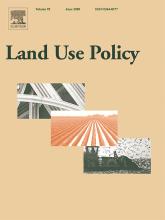Resource information
This paper offers solutions to some of the challenges around maintaining productive agricultural land close to cities in countries facing a decline in urban populations. In such circumstances, some farmers have been observed to convert their land into real estate and leave farming before land prices decline, therefore decreasing the area of agricultural land close to large cities. In contrast, many suburban farmers in developed countries remain in farming even when land prices decline and suburbs shrink. We argue that such behaviour can be explained by a desire to remain in farming, even at the expense of profits. In such cases, agricultural income may be supplemented by rental income or by selling land. This paper demonstrates that, when land prices are high, a preferential taxation system may help farmers with real estate income to retain more of their land. This study is based on data from a survey of farmers in Tokyo, Japan where, in 1992, a programme combining preferential taxation and restrictions on the conversion of farmland was implemented. Our findings suggest that farmers in more populated areas with a strong dependence on real estate income tend to continue farming, as do those in less populated areas who are less dependent on this income source. Analysis further suggests that imposing heavy taxes on residential property simply increases living costs for farmers and results in the loss of agricultural land and that policies which promote diversification and reduce housing costs are important for keeping urban fringe land in agriculture.


